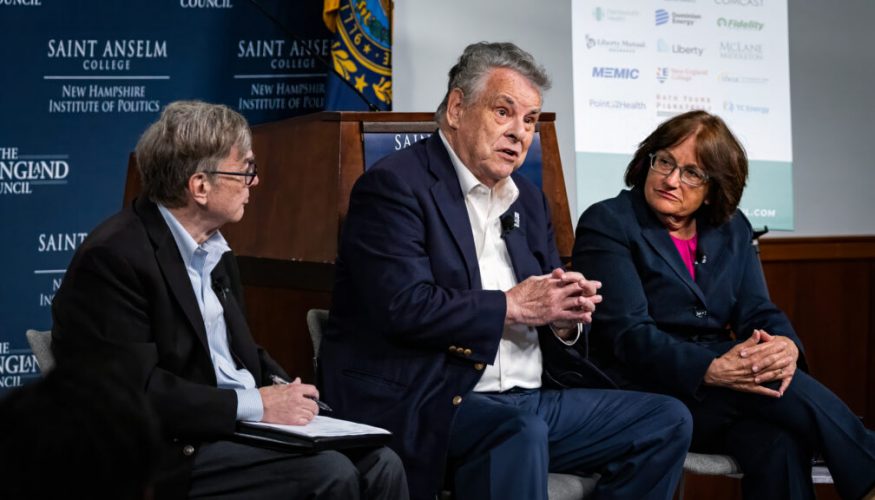NHIOP serves up Politics and Eggs with Cook, King, and Kuster

By Dan Splaine, Manchester Ink Link
The New England Council (NEC) hosted another edition of its Politics and Eggs events at the New Hampshire Institute of Politics (NHIOP). The Politics and Eggs series began in 1995 and features presidential candidates and prominent politicians in conversation with northeastern business leaders.
The program featured a conversation with Charlie Cook, the founder of the Cook Political Report and a highly regarded political and election analyst. He was joined by former New York Congressman Peter King, former New Hampshire Congresswoman Annie Kuster in conversation moderated by NEC President & CEO Jim Brett.
Charlie Cook began with an overview of the 2024 election and his analysis that, much to the contrary of the GOP claim, it could not credibly be defined as a landslide or mandate. In fact, it was a nearly even split of voting percentages with narrow margins of gains.
“The drop for Democrats was less than one percentage point in the House, less than one in the Senate. That’s called not much happening. In terms of chambers, you had, you know, two, you had three total changes, two net, from Democrat to Republican, either moved from Democrat to tie or from tie to, you know. But it was, when you’re talking about 4,000 races (state legislators), it was about as close to not much happening.
Referencing the electoral impact of reproductive rights supporters in the election, he said, “The thing about it is the idea that the Dobbs decision backlash brought in the sea of pro-choice voters that came in and voted for Democrats against Republicans. And that’s why Republicans didn’t have as good a night as you might expect, given the circumstances. Unfortunately, the data doesn’t back it up.
He attributed the underwhelming Republican results to an issue with candidate quality saying,” And I would argue that you had about two dozen states around the country, or you had two dozen races around the country for U.S. Senate, Governor, Attorney General, Secretary of State, and about eight or ten House seats, where if Republicans had just nominated a potted plant, they’d have had a 50-50 chance of winning. But no, they nominate somebody that’s a nut job. And somebody that could win in a ruby red state or district, but they can’t win purple states.”
President Biden’s loss was foreseeable, Cook observed, saying, “And the reality is, President Biden’s chances of getting re-elected evaporated in the second half of 2021, his first year in office, when his job approval rating dropped 14 points in a four-month period of time between June and October. And it basically fell into this Bermuda Triangle. The border, cost of living, and Afghanistan.”
He closed with comments on the future ot New Hampshire regaining its status as the first in the Nation primary. Noting the value for candidates and campaigns connecting with voters in community centers and answering questions from astute New Hampshire voters.
“New Hampshire, they know the deal. and they have entities like this. (NHIOP) And that’s why I think it’s really a shame what did happen, and I think it’s something that’s going to be, I suspect, will be fixed. And I expect to be in this room a lot of times over the next year or two,” Cook said.
Kuster, who served six terms as a U.S. Congresswoman, described the challenges facing Democrats and candidates in general. She began with the impact of the shrinking local media presence on campaigns. In her last campaign, she ran into limited availability of reporters and photographers
“Even when I would do the editorial board, in the beginning, I’d get a whole editorial board, Nashua Telegraph, Union Leader, Valley News, all of them. By the time I finished, we’d call and they’d say, yeah, we don’t have any money available to do that, to write an editorial about an election,” said Kuster.
She also reflected on the age issue, noting her decision to leave in comparison to other members of the House. The death of three elderly Democratic House members this term could have been the deciding factor in the closely divided House votes so far.
She also pointed out that the Republican term limits on committee chairmanships provide an advantage and is a system her party should adopt.This system leads to more congressional careers ending with people in their sixties instead of hanging onto chairmanships well into their eighties.
The Republicans made a change that’s very significant. And it goes under the radar. But when you use the term for chairs of committees, you fundamentally change the experience of being in Congress. Because people come in, they have a six-year term, but there’s turnover. So they work their way up the committee, they serve as chair, as you did so eloquently,” she said, gesturing to Rep. King. “Maybe you would have liked to stay longer, I don’t know. But then they move on. Very rarely, they move to another committee.”
Congressman King noted the changes in voting patterns of typically blue-collar democratic voters who went for Trump. His ability to connect with them rhetorically was the deciding factor in this election.
“I say this, that the Democratic equivalent of that is AOC. I didn’t see her in New York, with what I think was a good policy. It was crazy. What are the Democrats doing? But she expressed this in a way that the average person, somehow, was maybe not that interested in politics. She was able to strike a chord. Same with Trump,” King said.
The New England Council is a non-partisan alliance of businesses, academic and health institutions, and public and private organizations throughout New England formed to promote economic growth and a high quality of life in the New England region. This year, the NEC will be celebrating its centennial anniversary.